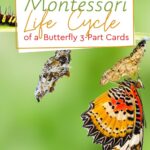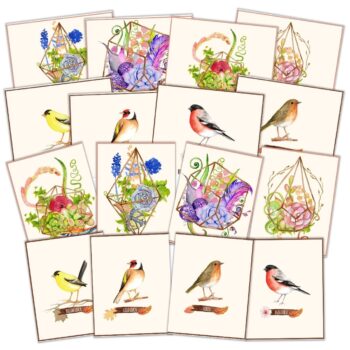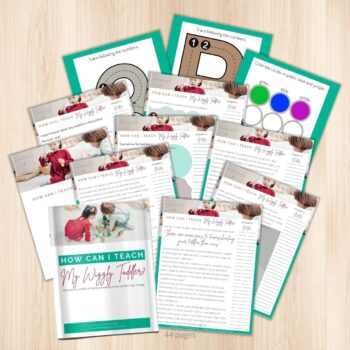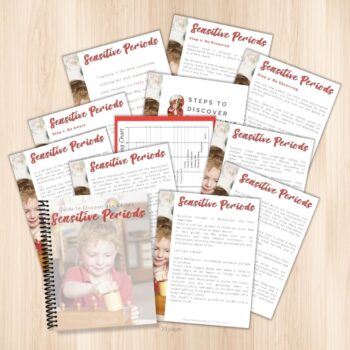Emphasizing respect, independence, and a carefully prepared environment, Montessori principles foster a lifelong love of learning and holistic development. Early childhood is a critical period of cognitive, social, and emotional growth, and applying Montessori principles during this stage leverages a child’s natural curiosity and potential. In this article, let’s discuss the transformative power of doing Montessori from birth with your baby.

A Prepared Environment
A foundational aspect of this method is the prepared environment, which should be safe, engaging, and conducive to independent exploration. Such an environment includes easily accessible shelves, a movement area with a soft rug, and mirrors to encourage self-discovery.
Respecting a child’s individuality is another core tenet of the philosophy. Observing and providing opportunities tailored to each child’s pace of development and interests helps foster self-esteem and confidence. For example, rather than imposing a rigid schedule, parents and caregivers follow the child’s natural rhythms.

Don’t Get in the Way
Independence is also encouraged from a very young age. Simple activities, like allowing an infant to attempt grasping toys or self-feeding, help develop autonomy and problem-solving skills. Offering a balanced support system allows children to learn from their efforts and experiences.
Furthermore, fostering a love of learning by catering to an infant’s natural curiosity sets the stage for self-motivated learners. Sensory materials, such as textured fabrics and musical instruments, are crucial for brain development and future learning.

The Power of Montessori Principles
More thought went into every aspect of The Montessori Method than meets the eye. The more you learn and the deeper you go into it, the more it makes sense. Once you see it and understand it, you can never unsee it. The Montessori philosophy truly is, in my humble opinion, the best way to introduce your baby and young child to the world.
Social development is nurtured by creating a calm and respectful emotional environment. Responsive caregiving builds secure attachments and trust, enabling children to develop empathy and positive social interactions.
Integrating these principles from birth honors the child as a whole person, profoundly impacting their developmental journey by respecting individuality, preparing enriching environments, encouraging independence, and promoting social and emotional well-being.
Understand the power of making small, yet permanent transformations. Start with one or two things that you can do consistently until they become a routine. Then add one or two more. Don’t overwhelm yourself, but also don’t let too much time go by before you keep adding new Montessori principles to your lifestyle.
Babies grow too fast. Don’t miss out on the best years where their minds are absorbent like little sponges. You can do Montessori from birth, just be as prepared as you can. Keep the routine, keep yourself motivated. Celebrate the little victories. Your baby is worth it all.
You might also enjoy these relevant topics:
- Montessori from Birth: Why Start from Day One
- 10 Essential Montessori Toys for Your Baby’s First Year
- The First Year of Life: Developmental Stages and Key Milestones
- How to Start doing Montessori with your Baby
- A Comprehensive Montessori Guide for New Parents
- Strategies for Fostering Independence in Babies
Montessori Wooden Baby Toy Set – 6 Pieces of Rattles, Push Car and Newborn Toys for PgUp Baby Play Gym Wooden Baby Gym with 7 Toys, Foldable Wooden Play Gym Frame Hanging
PgUp Baby Play Gym Wooden Baby Gym with 7 Toys, Foldable Wooden Play Gym Frame Hanging hahaland High Contrast Baby Flashcards – Black and White Infant Baby Cards 0-6 Months Tummy Time
hahaland High Contrast Baby Flashcards – Black and White Infant Baby Cards 0-6 Months Tummy Time MORITECK Spinning Drum, Montessori Toys for Babies 6-12 Months, Infant Kids Developmental Wooden Toy for Boy
MORITECK Spinning Drum, Montessori Toys for Babies 6-12 Months, Infant Kids Developmental Wooden Toy for Boy Montessori Play Kit for 0-6 Month Baby Tummy Time Interactive Toys Baby Brain Development Toys Rattle
Montessori Play Kit for 0-6 Month Baby Tummy Time Interactive Toys Baby Brain Development Toys Rattle Montessori Babies
Montessori Babies
- Printable Montessori Holiday Gift Guide
 I’ve made it very simple for you to get your hands on these fantastic ideas for Montessori education!
I’ve made it very simple for you to get your hands on these fantastic ideas for Montessori education! - Understanding the Montessori Curriculum for Preschoolers
 What exactly makes the Montessori preschool curriculum stand out? Let’s find out here!
What exactly makes the Montessori preschool curriculum stand out? Let’s find out here! - Montessori Life Cycle of a Butterfly 3-Part Cards
 In this post, we will talk about how you can teach children with Montessori life cycle of a butterfly 3-part cards.
In this post, we will talk about how you can teach children with Montessori life cycle of a butterfly 3-part cards. - Introduce Hibernation, Migration and Adaptation to Children
 When you introduce your children to the concepts of hibernation, migration and adaptation, you will love to learn how they find food, which ones follow each of these survival techniques and so much more.
When you introduce your children to the concepts of hibernation, migration and adaptation, you will love to learn how they find food, which ones follow each of these survival techniques and so much more. - 8 Easy Montessori Culture Activities
 In this post, let’s discuss 8 easy ways in which you can incorporate Montessori Culture activities for young children.
In this post, let’s discuss 8 easy ways in which you can incorporate Montessori Culture activities for young children. - Mastering Montessori at Home: Why Planning is Key
 Implementing Montessori at home can be a rewarding, yet challenging, journey. To ensure success, planning is key.
Implementing Montessori at home can be a rewarding, yet challenging, journey. To ensure success, planning is key.


















Leave a Reply